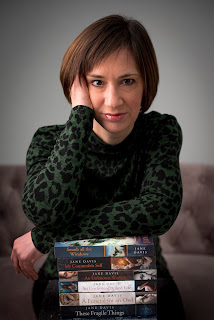
Amazon UK • Amazon US • Amazon CA • Amazon AU
Barnes and Noble • Kobo • Apple • Smashwords
The house they alight in front of is weatherboarded and painted white, a feature that binds the row of cottages and houses together. Each has a distinct personality, some grand, some far humbler, punctuation marks squeezed between established sentences. The winter rose threaded through the trellised porch is well-established, but the doorknocker is a new addition, fashioned in the shape of a fox, complete with head, front legs, paws and tail. Robert knocks, three distinct raps of brass on brass, at the same time looking down at his daughter. His bones cry out when he sees her gold-flecked eyes, so like Gerrard’s.
Though I know not what you are, twinkle, twinkle, little star.
Footsteps and the rattle of a chain. Robert clears his throat. “There’s no need to be nervous. Just be yourself.”
“I’m not at all nervous,” comes her reply.
The door is opened by Oswald Hoddy. “Mr Cooke.” He prods the nosepiece of his spectacles. “And you must be Miss Cooke.” As he looks beyond them to Loax and the photographer, his smile dissolves. “I didn’t realise…”
“I thought the occasion ought to be commemorated,” Robert says.
Mr Hoddy glances over his shoulder. “My sister isn’t accustomed to being photographed.” His voice is low. “Perhaps you’ll give her a little time to get used to the idea.”
Here is clarity. “So your sister is our winner?” Only now that Robert can see the black pinpricks where Mr Hoddy’s beard will break through does he acknowledge the direction his thoughts had taken. Had Miss Hoddy attempted to hoodwink him by disguising herself as a man?
“I simply acted as her surveyor. This moment belongs to Florence and Florence alone. Won’t you come in?”
He stands aside, pointing the way down a corridor so dark and narrow that their arrival at the rear of the house comes as a violent explosion of light. Robert squints, raising a hand to shield his eyes.
“Hello, Miss Hoddy,” he hears Ida say, without waiting for any kind of introduction. “I liked your drawing very much. The cottage especially.”
“Oh, I’m so glad!” The voice within the glare is as clear and bright as the bells that summon the faithful to All Saints.
“Was it from a dream?”
Robert wonders that his daughter can see. All he can determine is an outline, someone seated in front of the window, haloed by the low winter sun.
“I don’t paint dreams, as far as I know.”
That is not quite true. He is beginning to realise that she painted his.
“I draw,” Ida says.
Robert thinks of the spoiled wallpaper. It seems a boast too far for Ida to call her scribblings ‘drawing’.
“And do you draw what you see in your dreams?”
“Sometimes I do.”
“Isn’t it strange that so often we see better with our eyes closed? Logic would have us believe it should be the other way around.”
“Have you drawn many gardens before?”
“Only ours.”
Robert, who has been blinking back his temporary blindness, finds that the white impressions on his retinas are dulling. When he takes down his shield of slatted fingers, Miss Hoddy’s face is turned away from him. It is her neck he notices first, how slender it is, the fine fronds of dark hair escaping their pins.
“It’s very pretty.” A step closer and Ida’s nose will be pressed against the glass.
“It will be prettier still in the summer. If you look, you’ll see it has a lot of paths, so that my brother can wheel me about without causing himself an injury.”
At the mention of wheels, Robert’s eyes flit to Miss Hoddy’s rattan bath-chair. His winner is an invalid.
“Why does he wheel you about?”
“Because my legs don’t work.”
Miss Hoddy’s legs, he sees, are covered by a tartan rug. Little wonder she left the surveying to her brother. Robert, too, seems unable to move, not even to open his mouth and tell his daughter not to stare.
“What happened to them?”
He can remain silent no longer. “Miss Hoddy, I must apologise for my daughter’s forwardness.” His voice is tinged with embarrassed laughter, a father’s indulgence.
Ida turns to him, devastation written on her face. She has done exactly as he asked. She has been herself.
Miss Hoddy reaches for Ida’s hand, as if she has more of a right to it than he. She gives Robert a bold look. “Why apologise?” A fine face, not pretty – her cheekbones are too pronounced for that, her chin too square – but most certainly handsome. Skin, pale in the way of those who spend their days indoors. Younger than himself at a guess, but old enough to be referred to as a spinster. “It was a perfectly reasonable question.” Gently, Miss Hoddy pulls his daughter closer, until she is standing between the chair and the windows, where she tells her, “I had an accident. I was hit by an omnibus and my legs were damaged.”
An image rears up at Robert. Two horses, eyes wild, ears pinned back, whinnying, snorting, panicked. The conductor pitched from his running board into the road. He prays Ida’s imagination is not as vivid as his own.
“Goodness,” Ida says, clearly impressed.
“They tell me I was pulled underneath the wheels.”
Connect with Jane:







No comments:
Post a Comment